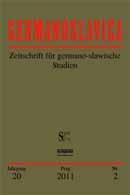Aspekte des Nationalismus in der Tschechoslowakei nach 1918: am Beispiel der Romane Unterm Mittagsstein (1992) von Zdeněk Šmíd und Eine Frau (1974)
Nationalisms in Czechoslovakia after 1918: on examples of the novels Cejch (1992) by Zdeněk Šmíd and Eine Frau (1974) by Peter Härtling
Author(s): Michaela PeroutkováSubject(s): Language studies
Published by: AV ČR - Akademie věd České republiky - Slovanský ústav and Euroslavica
Summary/Abstract: In the study the literary depiction of cultural, social and political events in Czechoslovakia after 1918 in the context of the Czech-German coexistence is explored. Comparing the Czech novel Cejch (1992) by Zdeněk ŠMÍD and the German novel Eine Frau (1974) by Peter HÄRTLING I analyze the impacts of the foundation of Czechoslovakia on lives of both Czechs and Sudeten Germans. I focus on the depiction of Czech and German nationalism and the identification processes within the new Czechoslovakian state. Sudeten Germans became a minority on both political and emotional levels and Czechs were in charge of their own state for the first time of their existence. It is my intention to show different types of Czech and German nationalism, its origin and its representatives. On one hand, both the novels show stereotypical views of nationalism and its supporters. On the other hand, they serve as examples of an unconventional historical narrative about the Czech-German coexistence, which was abruptly ended at the end of World War II when Sudeten Germans were expelled from Czechoslovakia.
Journal: Germanoslavica
- Issue Year: XXII/2011
- Issue No: 2
- Page Range: 84-101
- Page Count: 18
- Language: German

